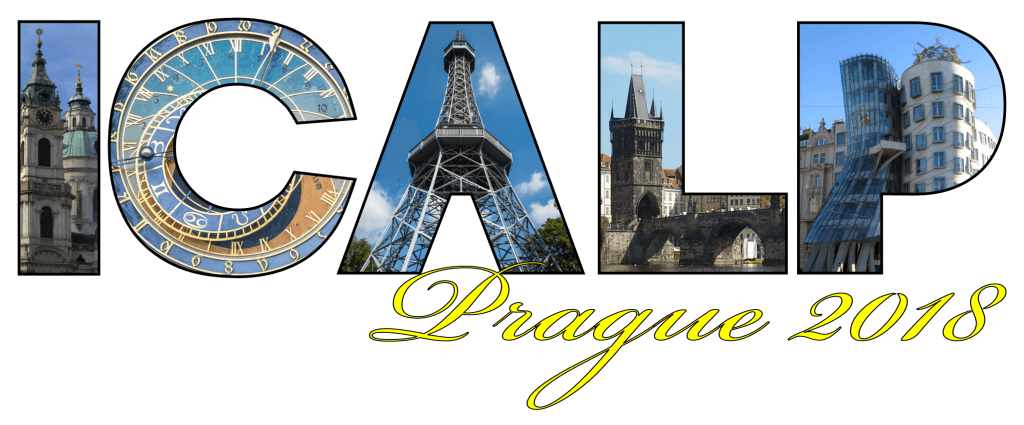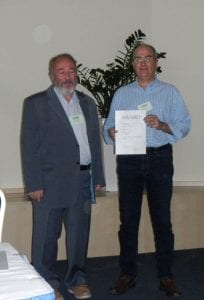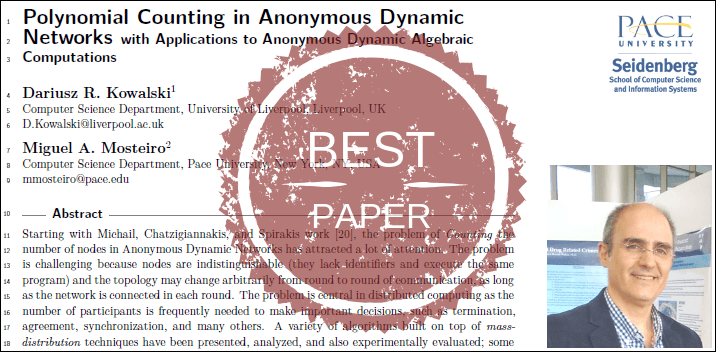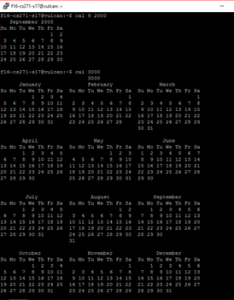A paper written by Miguel Mosteiro, assistant professor of computer science and algorithms whiz at Pace University, was selected as best paper at ICALP 2018. Known internationally as one of the top theory conferences worldwide, the achievement is significant for Dr. Mosteiro and collaborator Dariusz Kowalski, a computer science expert from the University of Liverpool.
 The paper, titled “Polynomial Counting in Anonymous Dynamic Networks with Applications to Anonymous Dynamic Algebraic Computations,” is just one of the results of a series of research that Miguel and collaborators, including Seidenberg students, have worked on over the past few years.
The paper, titled “Polynomial Counting in Anonymous Dynamic Networks with Applications to Anonymous Dynamic Algebraic Computations,” is just one of the results of a series of research that Miguel and collaborators, including Seidenberg students, have worked on over the past few years.
“It was during my research visit to the University of Bordeaux in 2015 when my host, Alessia Milani, made me aware of the Counting problem in Anonymous Dynamic Networks,” explains Miguel, who is based at Pace University’s Seidenberg School of Computer Science and Information Systems’ New York City campus. “At that point, the problem had already attracted a lot of attention because knowing the number of processors is fundamental for Distributed Computing, but the best upper bounds known on the running time were DOUBLY-exponential. Jointly with Alessia Milani, we improved the running time exponentially designing a novel protocol during that visit. Later on, my student Maitri Chakraborty showed experimentally that our protocol completes the computation in polynomial time, but not having a theoretical bound better than exponential we could not guarantee termination in practice. Anyway, this research was a first big step that resulted in three publications and university-wide researcher- and mentor- awards for my student and me.

“The interest on solving Counting in polynomial time continued, and by last year we were three research groups heavily working on it independently. During my 2017 summer visit to the University of Liverpool and the University of Wroclaw, I worked intensively with my host Dariusz Kowalski in designing a new Counting protocol. Our plan was to transform Incremental Counting so that we could apply Markov Chain analysis to bound the running time. There is always a magical moment in these developments and ours was when I was giving a talk to Kowalski’s students. Explaining the challenges of Counting, and what was the core technical difficulty, the key idea for a new protocol became apparent. Seminal ideas are fundamental but one still needs to work a lot on the technical details to realize them in theorems, which we did last Fall.”
Dr. Mosteiro and Dr. Kowalski presented the paper at ICALP 2018, which took place in Prague over summer, where the importance of the problem it addresses and the strength of the contribution will be recognized with the award for best paper.
The Chair of the Computer Science Department, Dr. Christelle Scharff, congratulated Miguel on the achievement, noting that it was a great achievement, mentioning “how prestigious it is!”
Seidenberg School Dean, Dr. Jonathan Hill, also offered his compliments: “We are, indeed, in the presence of greatness! Congratulations, Miguel, on this accomplishment.”
“We are very grateful,” says Miguel about the award, and added: “as I am for the support of Seidenberg School, SRC, and Kenan Fund. Without that support, I would not have been able to visit my colleagues and focus on this research.”
Congratulations Dr. Mosteiro! If the feedback from our students is anything to go by, there is a lot to be proud of!




 In CS 271, the focus is on the fundamentals of Unix. This multitasking and multi-user operating system offers a simple set of tools that perform a limited, well-defined function with a file system that is used as the main source of communication. Depending on what task you are trying to complete, Unix can be used to get it done! One of their class projects was to work on basic commands. Gianna was able to make a print out calender (pictured) for any month of the year by typing in “cal” followed by a month and/or year.
In CS 271, the focus is on the fundamentals of Unix. This multitasking and multi-user operating system offers a simple set of tools that perform a limited, well-defined function with a file system that is used as the main source of communication. Depending on what task you are trying to complete, Unix can be used to get it done! One of their class projects was to work on basic commands. Gianna was able to make a print out calender (pictured) for any month of the year by typing in “cal” followed by a month and/or year.